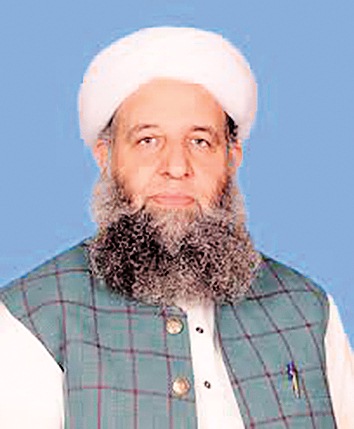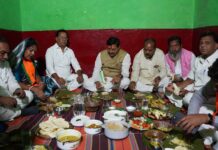September 30, Noor-ul-Haq Qadri, Pakistan Minister for Religious Affairs and Inter-faith Harmony, shared the stage with Laskhar-e-Taiba and Jamat-ud-dawa founder Hafiz Saeed. It has triggered a controversy that throws the spotlight yet again on Prime Minister Imran Khan’s dalliance with extremist elements.
The minister
Qadri is from Khyber agency, a Federally Administered Tribal Area. He is a Sunni Barelvi pir, and was elected as an independent candidate to the National Assembly in 2002, 2008 and 2018; he lost in 2013. He served in the Pervez Musharraf cabinet as Religious Affairs Minister, and in the Pakistan People’s Party (PPP) cabinet of Prime Minister Yusuf Raza Gilani as Minister for Zakat and Ushr. He offered support to Imran Khan’s government and was taken into the Cabinet.
Pakistan Foreign Minister Shah Mahmood Qureshi, who was publicly questioned in Washington last week about Qadri’s presence alongside Saeed, a UN-designated terrorist, said: “I think he (Qadri) should’ve been more sensitive, but it wasn’t that he subscribes to his (Saeed’s) point of view,” he said.
 Noor-Ul-Haq Qadri
Noor-Ul-Haq QadriThe event at which Qadri rubbed shoulders with Saeed was a meeting of the Difa-e-Pakistan Council (Defence of Pakistan Council). It was founded by the LeT/JuD chief in October 2011. In 2012, the US announced a reward of $10 mn for information leading to Saeed’s arrest. In his speech at the meeting, Qadri made it clear that it was on Prime Minister Imran Khan’s orders that he was there.
The DPC includes some 40 religious groups brought together by Saeed. Its main objectives at the time were to stop Pakistan from improving ties with India (a new visa regime between the two countries was in the works and the PPP government was mulling grant of the long overdue MFN status to India), and with the United States. Others in the DFC include the Jamiat-e-Ulema Islami led by Sami-ul-Haq (he is the president of the DFC), who runs the Darul Uloom Haqqania seminary in Akora Khattak. The madrasa is well known as a Taliban factory. It counts among its graduates Mullah Omar, founder of the Taliban, and Jalaluddin Haqqani of the Haqqani network. There is also the sectarian Ahle Sunnat Wal Jamat, earlier known as Sipah-e-Sahaba Pakistan, from which was born the Laskhar-e-Jhangvi, a banned terrorist organisation that targets Shia and Ahmadi.
Imran and extremists
Imran Khan sent a special message to the DFC at its very first rally in December 2011, and in February 2012, sent party vice-president Ejaz Chaudhary to its Karachi rally, where he said the Pakistan Tehreek-e-Insaf (PTI) leader was fully supportive of the objectives of the DFC.
In January 2018, after the PTI entered into an electoral alliance with Sami-ul-Haq’s JuI, the then PTI Chief Minister of Khyber Pakhtunkhwa, Pervez Khattak , attended a DFC rally in Peshawar called the Tahaffuz Baitul Muqqadas Conference. Saeed addressed it by telephone, while another JuD leader, Abdul Rehman Makki, was present on the stage. Makki is Saeed’s brother-in-law. The US has offered a reward of $2 mn for information leading to his arrest.
But the international censure never forced Pakistan to act against either Saeed or Makki. This year, the LeT/JuD entered the electoral stakes as part of a “mainstreaming” project, which could not have been undertaken without the blessings of the security establishment. The group was allowed to contest as the Allah u-Akbar party. It did not win any seats.
At the September 30 meeting, among the others who shared the stage with Qadri and Saeed were Sami-ul-Haq and former ISI chief Asad Durrani, according to a comprehensive report on the website of Middle East Media Research Institute, quoting several Pakistani Urdu newspapers.
Quoting the Jang, MEMRI reported Sami- ul-Haq saying in his speech that “the government should make such a policy that India cannot threaten us. The Kashmir issue cannot be resolved without jihad.” Various religious and Kashmiri leaders, who spoke on the occasion, said: “Pakistan has not made a nuclear bomb to keep as a decoration in an almirah.” Quoting the Roznama Umat, the MEMRI report says the declaration adopted at the meeting demanded that “the Indian terrorism in Kashmir be investigated by an international war crimes tribunal,” and that “India be declared a terrorist country.”







